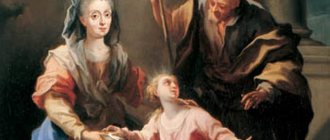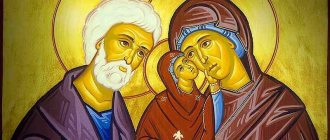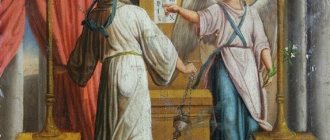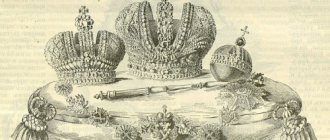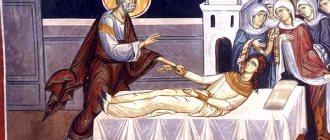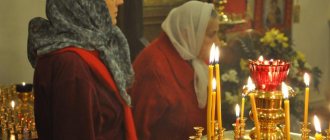What are name days
In Orthodoxy there is such a thing as name days. A person celebrates them on those days when believers remember the life path of one of the Saints with his name. It is traditionally believed that the name day is the day of remembrance of the Saint, which falls on a date close to the person’s birthday. The remaining days of remembrance of the Saints will be considered “small name days.”
In the old days, name days were called Angel Day. This is due to the fact that man’s heavenly intercessors were called Angels. This name cannot be called correct, since Saints and God's Angels are not identical concepts, but this definition has taken root and is still used among the people.
Important! If a child is called by a name that is not in the calendar, the priest gives him a second name during the christening. The great martyr who bore this name will be the heavenly protector of the child.
Patron Saints
In Orthodoxy, several women with this name are revered, famous for their Christian exploits and godly deeds. The patroness of a girl named Anya will be the Saint whose memorial day follows immediately after the girl’s birthday.
Saint Anne
Righteous Anna, the mother of the Blessed Virgin, was the daughter of a priest from Bethlehem. For twenty years after her marriage, Anna could not conceive a child, but one day an Angel appeared to her, bringing good news to the woman.
The Messenger of God said that Anna would soon give birth to a daughter who would be blessed by the whole world. So Saint Anna gave the world the Most Pure Virgin Mary. Now the righteous woman is considered the main patroness of all girls and women bearing this ancient and beautiful name.
Anna Rimskaya
The Christian feat of St. Anna was not forgotten even after many centuries. The girl, who refused to marry a pagan, humiliated but not broken, was able to lead many people to the Christian faith, including her failed fiance. For this, she suffered severe torment from idolaters, but did not renounce her faith. Saint's memorial days are February 3 and June 18.
Anna the Prophetess
Saint Anna became famous for her godly life and good deeds. The girl was born into a wealthy and very religious family. She got married early and loved her husband with all her heart, but after 7 years of family life, he died from an unknown illness. After the death of her husband, Anna decided to devote her life to the Lord and settled at the Jerusalem Temple.
Articles about saints:
While living there, she was one of the first to have the honor of seeing the birth of Jesus Christ, who was brought there by the Virgin Mary and Saint Joseph. She told everyone the good news, for which she was later called a prophetess. St. Anne's commemoration days are February 16 and September 10.
One should not think that the name Anna was glorified by Christian deeds only by righteous women in ancient times. This name was borne by many new martyrs who suffered hardships for their faith and were canonized quite recently.
New Martyr Anna Efremova
Saint Anna was a nun who was repressed and executed during the years of Soviet power. The day of remembrance of the Venerable Martyr is February 17.
New Martyr Anna Popova
The woman was convicted and sentenced to death during the years of Soviet power, during the time of brutal persecution of the Church. She was shot on January 11, 1942, since then this January day has been considered the day of her memory and the name day of girls named Anna.
New Martyr Anna Lykoshina
Anna Petrovna was a believer, a parishioner of the Church of Sergius of Radonezh in St. Petersburg. In 1924, she was convicted on trumped-up charges and exiled to the Solovetsky camp, where she died, unable to withstand the inhuman conditions of the prisoners.
Brief biography and how saints with the name Anna help in Orthodoxy
Sant'Anna is united not only by their name, but also by their commitment to faith in the Lord. The stories of the saints are different. All women received recognition during their lifetime or shortly after death.
Princess Kashinskaya
This is one of the most tragic figures in the history of Russia during the period of the Mongol-Tatar yoke. Anna was brought up according to the rules of the Christian faith and married Prince Mikhail of Tver. During the marriage, the princess had five children. The princess's husband fought tirelessly for the right to inherit the throne. Soon after the next battle, which expanded the borders of the principality, Mikhail was summoned to a meeting with the Khan's Horde. There he was brutally killed, Anna was left a widow.
After the subsequent death of two children, Anna accepted the scheme. Having become the abbess of the monastery, Anna gained recognition throughout her life. She led a righteous life and was canonized after her death.
A precedent for decanonization is associated with his name. This phenomenon became possible thanks to the ideas that arose during the reign of Patriarch Nikon. In connection with the change in the rules, a branch arose that designated the Orthodox who did not agree with the changes as Old Believers. During the reign of Nicholas II, Princess Kashinskaya was again canonized, although popular veneration remained unchanged throughout the entire period of non-recognition of her as a righteous saint. The princess is traditionally expected to provide healing, marital harmony, humility, and strengthening of faith.
Prophetess
The prophetess is mentioned when they describe the introduction of the baby Jesus into the temple by her parents. Together with the elder, the child was welcomed by Simion, who is called the recipient of God, both saints are mentioned at the same time. They are quoted from Holy Scripture. Soon after death, elders are canonized.
When Christ's parents appeared on the threshold of the temple, the prophetess led a righteous life, she lived in the temple. His life was described in detail by Dmitry Rostovsky. The prophetess is the protector of children. People turn to her when they ask about the health of children, as well as when they want to conceive a child suffering from infertility. The prophetess is traditionally required to show humility and strengthen her faith; Anna helps widows overcome loneliness and helps many believers cope with losses or failures.
Mother of the Virgin Mary
Saint Anne is one of the iconic figures of world Christianity. Her marriage to Saint Joachim was important for understanding the genealogy. Bonds united the ruling and ecclesiastical branches. Anna gave birth to a daughter at a respectable age; this happened after an angel brought good news to her husband. The name of the mother of the Virgin Mary is mentioned in only a few sources; the canonical writings do not mention her.
it is known that the marriage of Anna and Joachim remained childless for a long time. Additionally, the sources mention that the Virgin Mary was raised according to strict principles set by her parents. They ask a righteous woman for healing, the health of loved ones, and protection of children from adversity and failure.
Adrianople
The name of the martyr was given by analogy with the name of the city in which he lived. The third century in Adrianople was a time when the Christian faith was just beginning to emerge. Pagans in many areas of the city brutally beat new Christians, ridiculing the faith. The execution of the Christian Bishop Alexander, an ascetic of Christianity, took place in one of the city squares.
The bishop's torment was inhuman, but he steadfastly fought the pain, prayed and never made a sound again.
Shortly before Alexander's death, a miracle happened: his wounds suddenly healed. This did not help him survive, but it demonstrated the strength of the Christian faith. Some of those present at the execution immediately converted to the Christian faith. Among these people was young Anna. The girl was immediately executed along with others who had found faith. The Orthodox Church elevated the saint to the rank of martyr. They venerate her along with the other martyrs, asking for strengthening of faith and humility.
Vithynskaya
The righteous saint took monastic vows after the premature death of her husband and two children. During the persecution of nuns organized by Constantine V, Anna dressed as a man and settled on the territory of the Bithynia monastery.
His life was an example for many monks: he prayed fervently, observed numerous fasts and preached Christianity. Life under men's clothing was a burden for Anna, so the righteous woman spent the last years of her life outside the walls of the monastery, preferring complete solitude.
They say that for her labors and prayers, the emperor granted her his monastery, at the head of which she served for several years. They pray to the righteous saint for the gift of humility, for the strengthening of faith, for the healing of mental and physical wounds.
Gotfskaya
The persecution of Christians continued for several centuries. The stronger the faith, the more cruel the pagans were. In the 4th century, the life of a believer remained only when a Christian publicly renounced his views and made a sacrifice to a pagan idol, pre-established rules.
Anna Gotfskaya was one of those who did not want to give up her faith. For this, she, along with other believers, was burned alive in the church. After her death, the Orthodox Church gave her the status of a martyr. They turn to her with prayers for the health of loved ones, for healing, for protection from failures.
Novgorodskaya
Princess of Novgorod was born in Sweden. Princess Ingigerda was beautiful and devoted. She was married to Yaroslav the Wise, and so the princess became a Russian princess. The princess unconditionally fell in love with her new homeland, firmly defended the interests of her lands, was faithful to her husband, and became a role model for ten children born from the spouses.
During their reign, Princesses Irina and Yaroslav the Wise built several churches, schools, and parishes. In her old age, Irina took the nun's hair and took the name Anna. After her death, she was elevated to sainthood for her righteous life and numerous services throughout her life. They pray to the princess when asked to protect their children, strengthen their faith, and achieve family happiness.
Roman
A Roman martyr whose name is associated with many legends. It is believed that young Anna took a vow of celibacy, so when suitors and matchmakers came to her, she refused. The girl was humiliated for her Christian faith and integrity. She was taken out for the entertainment of the crowd and her clothes were torn. Immediately the girl grew long hair that covered her nakedness; for this reason, Anna is often depicted in icons with long hair.
Then an angel appeared to her and gave her a veil. All the suitors who approached the girl never had time to touch her. They wanted to burn the girl at the stake, calling her a witch, but the soldiers were unable to light the fire. The girl was killed with a sword because she did not give up her principles. This young martyr is a symbol of strong, sincere faith, chastity, and innocence.
Seleucian
One of the martyrs who became a victim of persecution of Christians in Persia is Anna of Seleucus or Persia. The woman was brutally killed by the pagans. He refused to give up and, without hiding, turned to his pursuers.
It is known that she was given 3 days to think, but she refused this too, so the public execution of the martyr took place.
On the icons she is depicted with her hands raised - this is a symbol of the fact that the woman preached Christianity until the last days of her life. They pray to her icon when they want to strengthen their faith, asking her for protection and humility.
Memorial Days of Other Saints
- The Venerable Anna of Novgorod is remembered on February 23.
- Akathists to the Holy New Martyrs Anna Popova and Anna Borovskaya are read on January 11, on November 23 they remember Anna Ostroglazova, on August 13 they read prayers to Anna Serova, on May 11 they remember Anna Shashkina.
- Memorial Day of St. Anna of Gotfskaya is April 8.
- Mother Anna Kashinskaya is remembered three times a year - June 15, August 3, October 15. Anna of Vithynia is remembered twice a year - on June 26 and November 11.
- In December they remember Anna Persidskaya, Anna Stolyarova, Anna Ivashkina.
The name Anna came to Russian lands from Greece with the advent of Christianity. It was widely used in ancient times and remains popular today. The example of heavenly patronesses helps to cultivate virtue, fortitude and piety in girls with this name.
November 20, 2022 at 02:34 pm
Icon "St. Anna of Goth" to order
Life of the Martyr Anna Gotfskaya
Very little information has reached us about the life of Anna Gotfskaya.
They were mainly written in the ancient synaxarium of the Gothic Church. It is known that Saint Anna was born and lived in the 4th century in Gotthia on the territory of modern Crimea. At this time, the Roman Empire was ruled by the emperors Valens, Valentinian, and then Gratian. All of them were pagans and cruel persecutors of Christians. Christian teaching came to the territory of Gotthia in 341, along with the first Christian priest, who brought it here and began his sermons. At that time, many people living in these parts were converted to the Christian faith, but they often preached it in secret, so as not to incur the wrath of the rulers.
Gothia, which consisted of many clans, was ruled in those years by the pagan king Athanaric. His hatred of Christians was immeasurable. On his orders, raids were constantly carried out in churches and places of possible Christian services. Saint Anna, despite her young age (she was only 17 years old at the time) and the dangers awaiting her, preached the Christian faith openly, constantly communicating with her brothers and sisters in Christ and attending Christian services. The main preacher of Christianity among them was the Arian bishop Ulfilas. Arianism was one of the earliest Christian movements, which affirmed the created nature of God the Son and his non-consubstantiality with God the Father.
One day, during one of the secret services, which was attended by more than 300 people, Athanaric’s warriors came to the temple. By order of their king, the soldiers closed the temple on all sides from the outside, so that no one could leave it, and set it on fire. As a result, almost all Christians died in the fire. We have only received information about 26 people who were present at the service on that terrible day. One of them was Saint Anna of Goth.
The other 26 holy martyrs were the presbyters Vafusius and Verk, the monk Arpila, the Gothic queen Gaafa and her daughter Princess Duclida, Prince Agathon, the parishioners of the temple Igathrax, Sila, Aviv, Constance, Ferm, Soniril, Suimvl, Agn, Reas, Iskoy, Sigits, Phyllus , as well as martyrs Anna, Uirko, Mamika, Larisa, Moiko, Animaisa and Alla.
Atanarich also, under penalty of death, forbade people to bury the remains of burnt martyrs according to Christian customs. However, Queen Alla Gotfskaya and her daughter Duklida, who miraculously survived the fire, were secretly able to collect the remains of the relics of Christians and transport them to Syria. After some time, Duklida transported part of these relics to the now destroyed city of Kizlik and gave them for the consecration of a Christian temple built in a cave.
Calendar, when according to the church calendar is Anna's name day
Saints with the name Anna are venerated 23 times.
- February 3 - Agnia Anna of Rome, martyr, virgin;
- February 16 - Anna the Prophetess, daughter of Phanuel;
- February 23 – Anna of Novgorod, reverend, princess;
- February 26 – Anna, venerable martyr;
- April 8 – Anna Gotfskaya, martyr;
- April 13 - Anna, the righteous;
- June 25 - Anna (monastic name Efrosinya) Kashinskaya, Tverskaya, schema-nun, princess;
- June 26 - Anna Euthymian of Bithynia, venerable (venerable, ascetic in male form);
- July 18 - Agnia (Anna) of Rome, martyr, virgin;
- August 3 - Anna (monastic name Efrosinya) Kashinskaya, Tverskaya, schema-nun, princess;
- August 5 – Anna of Leucadia, reverend;
- August 7 – Anna, mother of the Blessed Virgin Mary;
- September 10 - Anna the Prophetess, daughter of Phanuel;
- September 22 – Anna, mother of the Blessed Virgin Mary;
- September 23 - Anna Borovskaya, martyr (Lip.);
- October 15 - Anna (monastic name Efrosinya) Kashinskaya, Tverskaya, schema-nun, princess;
- November 4 – Anna of Adrianople, martyr;
- November 10 - Anna, martyr;
- November 11 - Anna Euthymian of Bithynia, venerable (venerable, ascetic in male form);
- November 16 - Anna Vsevolodovna, reverend;
- December 3 – Anna of Seleucia (Persia), martyr;
- December 11 - Anna, martyr;
- December 22 – Anna, mother of the Blessed Virgin Mary; Anna the Prophetess, mother of the prophet Samuel.
Temples and veneration
Many churches bearing the pious name of St. Anne were built on the territory of Russia and Europe:
- Kashinskaya. October 15 is revered as a righteous day. The most famous temple is located on the territory of the Vvedeno-Oyatsky Monastery.
- Prophetess. The Church of Simeon the God-Receiver and Anna the Prophetess was built in St. Petersburg. The saint is commemorated on the eve of his name day.
- Sant'Anna. The Mother of the Virgin Mary is honored by the celebration of the Assumption of the Blessed Virgin Mary on July 25. The Saint's Basilica is located in Jerusalem.
- Novgorodskaya. The princess is honored on February 23. Numerous temples and churches in Kyiv are named after her, and a convent was erected in the Novgorod region.
Anna is a significant name that began to spread in Russia with the adoption of Christianity. That is why the symbolism of the name, which is interpreted as a bearer of the good news, is often associated with Russian Orthodoxy.
Characteristics of the birthday girl Anna:
From the Hebrew language - “grace”. According to another version - “constantly (eternally) graceful, pretty.”
The similar-sounding name “An”, “Annu” was first found in Sumerian mythology (the Sumerians are one of the most ancient civilizations on Earth). In those days, it was the male name of the main heavenly god (father of the gods), who opened the list of all other revered gods in Sumer.
In later, also pre-Christian times, the name Anna (Anait) - fertile, divine - in Eastern religion (including among modern Chechens, Abkhazians, Armenians and Ingush) is the name of the goddess of the earth, fertility, love. In ancient Roman mythology, Anna. Perenaima (forever young) is the goddess of the coming new year, which was celebrated on March 15. Anna's name day is twice a year.
Anna, our contemporaries, are also kind, sacrificial, hospitable. Sometimes they suffer from physical disabilities: lameness, injuries. Annushki, as a rule, give birth to boys. The main character traits of Anna are great activity, powerful intuition, hypersexuality. She can safely be called a modern Eve, especially after you look into her eyes - passionate, as if scorching with the hot midday sun rays.
In childhood and adolescence, many Annas are very impudent. Anna always gets what she wants - treats, toys, a beautiful dress, and also the guy she has fallen in love with. She will follow on his heels, like a cunning fox or a lynx, and will watch over him like a victim who sooner or later falls into her “paws.”
Anna always gets her way. And she always wants everything at once. After Anna settles down, matures, achieves what she wants, she becomes completely different - calm, sedate. And her gaze is no longer passionate, but mysterious, like that of people who have secret knowledge.
Anna believes only in herself. She never listens to other people's advice, even the most useful, and if you insist, she will suspect you of some insidious plans against her. After all, Anna is very proud, and also vindictive, scandalous and conflict-ridden. As for Anna’s health, unfortunately, she is not very good. So, her stomach is far from all right. Brittle bones are often susceptible to fractures.
It is advisable for Anna to follow a diet and be careful while crossing the road to avoid accidents. She also needs to pay attention to her eyes and visit the eye departments of clinics from time to time. This will be very useful for Anna both for her health and as a specialist. After all, many Annas are interested in medicine, especially paramedicine, although in childhood they gravitated toward art and dreamed of becoming actresses, painters, singers, and sculptors.
And yet Anna is not as bad as she might seem at first glance. Do not forget that she has very powerful intuition, which contributes to the development of internal clairvoyance (insight).
Therefore, Anna has a good feeling about the development of the upcoming situation, which gives her the opportunity to always be the mistress of the situation. And Anna uses this position well, men are convinced of this very quickly. After all, Anna literally envelops them with her attention and charm. Thanks to her cuteness and charm, Anna wins the hearts of her loved ones and relatives, as well as all the men around her - both young and old. Perhaps that is why Anna always and everywhere feels like a queen among her subjects.
Anna does not like intellectual work, willingly avoids it, and although she refers to her inability, she actually does not really trust it: the intervention of the intellect, as it seems to her, will distort the “pure experience” of her intuition.
Martyr Anna of Goth, icon on board 13*16.5 cm
Life of the Martyr Anna Gotfskaya
Holy martyrs Vafusius and Verk , presbyters, Arpila the monk , laymen: Aviv , Agn , Reas , Igafrax , Iskoy , Sila , Sigits , Soniril , Suimvl , Ferm , Phil , Constance , Prince Agathon and martyrs: Anna , Alla , Larisa , Moiko , Mamika , Huirko , Animaisa (Animaida) , Gaafa, queen of the Goths , and Duclida, princess of the Goths , suffered around 375 under King Ungeric, who persecuted Christians.
The king ordered the temple to be set on fire during the service. 308 people died in the flames of the fire, of which the names of twenty-one martyrs are known. The widow of the Gothic king Alla and her daughter Duklida collected the remains of the holy martyrs and transported them to Syria. Then she returned to her homeland, where after some time she was stoned and died a martyr along with her son Agathon. The relics of the holy martyrs remained with Duclida, who, during the reign of Valentinian II (364 - 375) and Theodosius the Great (393 - 395), came to Cyzicus and donated part of the relics for the consecration of the temple. The death of the righteous Duklida was peaceful.
Troparion to the Martyr Anna of Goth, tone 4
Thy lamb, Jesus, Anna,/ calls with a great voice:/ I love Thee, my Bridegroom,/ and seeking Thee, I suffer,/ and I am crucified and buried in Thy baptism,/ and I suffer for Thy sake,/ I For I reign in You, and I die for You,/ yes, I live with You,/ but as an immaculate sacrifice, accept me with love, sacrificed to You./ Through my prayers, // as You are merciful, save our souls.
Kontakion to the Martyr Anna of Goth, tone 2
Your all-honorable temple, / as all faith has found spiritual health, / we cry out to you loudly, / to the great martyr Anna, pray unceasingly to Christ God for all of us.
Prayer to the martyr Anna of Gotfskaya
Oh holy Anna! Having fought a good fight on earth, you have received in Heaven the crown of righteousness, which the Lord has prepared for all who love Him. We also rejoice at the glorious end of your life and honor your holy memory. You, who stand before the Throne of God, accept our prayers and bring them to the all-merciful God, to forgive us every sin and help us against the wiles of the devil, so that, having been delivered from sorrows, illnesses, troubles and misfortunes and all evil, we will live piously and righteously in the present We will be honored by your intercession, even though we are unworthy, to see good on the land of the living, glorifying the one in His saints, the glorified God, the Father and the Son and the Holy Spirit, now and ever and unto the ages of ages. Amen.
Congratulations on Anna's name day:
Don't forget to celebrate Anna's name day and congratulate Anna on her angel's day.
Today Anna is one of the most popular female names in the world, found in almost all languages. Many famous women bore this name, and this explains the abundance of name days.
From an early age, Anna knows her worth and treats other people, especially close ones, with respect. As a child, she often brings home puppies and kittens, sincerely believing that she and no one else can help them. Even as she grows up, Anna retains her gentleness and mercy, but turns her attention to people.
Anya is a modest and kind girl; these character traits allow her to attract many friends and be a reliable support for them. Anna has a keen sense of justice, so she can even sacrifice her own well-being so that someone does not feel deprived or disadvantaged.
Anna takes good care of herself, dresses tastefully, wears beautiful hair and shoes. It is difficult to take her by surprise, even if you arrive unannounced, you will find Anna looking as if she had just done her makeup and changed clothes in anticipation of guests. Anna loves guests and gifts, so don’t forget to congratulate her unexpectedly, for example, on her name day.
Anna's name day according to the church calendar
- February 16
- February 23
- 10th of March
- March 14th
- April 8
- June 25
- June 26
- August 7
- September 22nd
- October 15
- November 4
- 11th of November
- December 15
- December 22
Anna's upcoming name day
Enter Anna's date of birth:
Choose a bouquet as a gift
In our catalog you will find many options for congratulations for Anna - bouquets, flower arrangements and flower baskets. Choose a gift right now and arrange a beautiful holiday for Anna!
During baptism, a person is given a name before God. As a rule, it is chosen from the names of saints, whose memory is revered on the nearest date after the person’s birthday. Consequently, a person receives a heavenly intercessor, whose memory day will be the name day. Now the tradition of celebrating Angel Day is returning.
This name is the most common and beloved on the planet. There are several saints with this name in the Saints. What does this name mean and when to celebrate the name day?
Character and destiny
In onomastics, the science of names, it is believed that a name leaves an imprint on a person’s fate. Anechka fully corresponds to her name - beautiful, harmonious and sympathetic. The main qualities of a person with this name are kindness and empathy . Unfortunately, sometimes people take advantage of this, which she knows about, but cannot resist. Anyuta is very attached to loved ones and is ready to do anything for them.
As a child, Anechka is very artistic , loves everything beautiful, is quite calm and not capricious, at school she is diligent, active, loves to participate in the life of the class, runs errands, in her youth she likes to imagine herself as the heroines of romantic books and films, and enjoys authority among her peers. Representatives with this name are sacrificial and take life too seriously. They very often sacrifice their own needs and dreams for the benefit of other people, which can result in an unsettled life and illness.
As for her personal life , Anyuta needs a sincere and caring man with an “easy” outlook on life, unlike her. Anya are wonderful wives: tolerant and economical. Often, endowed with an attractive appearance, Anya chooses a person with unremarkable external characteristics as her life partner.
The time of year in which Anya was born also leaves an imprint on her character:
- spring and summer Anechkas are soft and flexible, compliant,
- autumn and winter Anyuta - with a firm and decisive character.
Ani are distinguished by their strong will and insight, but they can often be overly suspicious and cynical . The most difficult trait of their character is the desire to take control of everything. But they easily find a language with other people, have a sharp mind and excellent memory, and are distinguished by a fair character. Anechka prefers working with people and creative professions.
When communicating with Anna, sharing your problems with her, you should not escalate the situation too much, or exaggerate the situation - thanks to her intuition, Anyuta will understand the true essence of the problem and will be able to provide help and support, and the hopelessness of her interlocutor can drive her into depression.
Anna's name day according to the church calendar
Since ancient times, there has been a tradition to celebrate Angel Day . Nowadays it is becoming common again. Orthodox people give the newborn baby a name chosen according to the Saints - the church calendar. As a rule, they choose the name of a saint who is revered on the nearest date after the baby’s birthday. This saint becomes the child’s patron. Sometimes it happens that there are several saints with a similar name in the Saints who are honored several times a year. In the case of the name Anna, the days of the angel according to the church calendar are celebrated 28 times a year:
- January 11 (New Martyr),
- 3, 16, 17 (new martyr), 23 and 26 February (new martyr),
- 11 (new martyr), 14 (new martyr) and 20 March (new martyr),
- April 8 and 13,
- May 11 (new martyr),
- June 25 and 26,
- July 18,
- August 3, 5 and 7,
- September 10 and 22,
- October 15,
- 4, 10, 11, 16, 23 (new martyr) and November 27 (new martyr),
- December 3 and 22.
These days will be name days for an Orthodox woman, but the main holiday is the date on which her patron saint is venerated. As a rule, this is the closest date after your birthday. This day will be a big name day and this is the main holiday in Anna’s life, and the remaining dates are small name days.
Saint Anne's list
There are many women named Anna in Orthodoxy. Some of them became known recently, others a long time ago. Many of them are heard by every Orthodox Christian.
Saint Anne, mother of the Virgin Mary
Here are the most famous Annas:
- Anna Adrinapolskaya;
- Anna - mother of the Virgin Mary (September 22 and December 22);
- Anna of Persia;
- Anna of Rome - often depicted on icons with long hair;
- Anna the Prophetess, mother of the prophet Samuel;
- Anna Kashinskaya;
- Novgorodskaya Anna;
- Anna Goftskaya;
- Anna Vifinskaya;
- Anna Efremova;
- Anna Gorokhova;
- Anna Chetverikova;
- Anna Shashkina;
- Anna Blagoveshchenskaya;
- Anna Serova;
- Anna Ivashkina;
- Anna Stolyarova;
- Anna Ostroglazova;
- Anna Borovskaya.
It is customary to celebrate Anna's name day cheerfully, but avoiding excessive consumption of alcohol. If the holiday falls on Lent, then it is not customary to drink wine, vodka or put meat delicacies on the table.
How to properly celebrate name days?
At this time, an Orthodox person should be closer to God and patron . It is recommended to go to church, take communion and confess. You should not gather noisy companies and indulge in excesses. Relatives and friends can congratulate the person on his name day and give gifts. In pre-revolutionary Russia, on this day they baked pies, attended church during the day, and in the evening gathered with their relatives at the festive table. Celebrating Angel Day is a wonderful family tradition.
In this article you will find the Orthodox name day calendar for every day of the year: male and female names according to the church calendar, the Orthodox calendar.
Information site about icons, prayers, Orthodox traditions.
"Save me, God!". Thank you for visiting our website, before you start studying the information, please subscribe to our Orthodox community on Instagram, Lord, Save and Preserve † - https://www.instagram.com/spasi.gospodi/. The community has more than 60,000 subscribers.
There are many of us like-minded people and we are growing quickly, we post prayers, sayings of saints, prayer requests, and timely post useful information about holidays and Orthodox events. Subscribe. Guardian Angel to you!
Anna – translated from ancient Greek means “grace”, “merciful”. A child who bears this name grows up artistic. Anna loves everything beautiful. She is good-natured, kind and sympathetic. But despite all the kindness and positive traits in her character, she very often faces a difficult path in life.
But despite this, girls with this name do not complain about their fate, but steadfastly withstand all the obstacles and trials that befall them on the path of life.
Saint Anna - life of the Mother of God
The righteous one, whose name means “mercy” in Hebrew, was the youngest daughter of the priest Matthan, who descended from Aaron, the elder brother of Moses, while the girl’s mother came from the tribe of Judah. The girl was raised in severity and piety, and at a very young age she was given in marriage to Joachim of Nazareth, a descendant of King David. Such a marriage had a deep sacred meaning - it reunited the lines of earthly rulers and spiritual mentors, symbolically announcing the coming coming of the Messiah.
Saint Anna and her husband led a virtuous and highly moral life - they donated a lot to the temple, supported the needy, and kept the Lord's commandments. But, despite the zeal of the spouses, they were childless for a long time. Due to the fact that the family “did not create offspring,” Joachim was denied the right to make a sacrifice to the Creator, and other Israelites cruelly mocked them. The grieving man went into the desert, and there an angel appeared before him, declaring that the righteous man would soon become a father. The joyful ascetic ran home, meeting his wife at the Golden Gate of Jerusalem - the seraphim also appeared to her. And after 9 months the woman gave birth to a daughter, who was named Maria.
As a sign of gratitude to God, the parents promised to send the child to the temple. When the baby was 3 years old, she was taken to church - and, to everyone’s surprise, as soon as the girl was placed on the first step, she independently ascended to the high priest Zechariah, where she was dedicated to the service of the Lord.
As some apocrypha say, the righteous woman joined the Holy Family when they were forced to flee to Egypt from Herod, and helped take care of Jesus Christ. Anna died at the age of 79, having spent the last years of her life at the Jerusalem Temple. The woman, like her husband, was buried in the Garden of Gethsemane on the edge of the Valley of Jehoshaphat.
Temple of the Iveron Icon of the Mother of God in the Dnieper, where the relics of St. Anna have been kept since 2008
Character of the birthday girl
Anna is a calm child. She is quite obedient and not capricious. Anna likes to imagine herself as the heroine of a romantic book. As a rule, she is the oldest of the children. She quickly gets used to being listened to, and she maintains an authoritative and commanding tone in her voice. During her school years, the girl is a “fighter for justice.” She resists everything she doesn't agree with. It should also be noted that the girl does not succumb to the influence of others. She always does what she thinks is right.
But despite the above-described main character traits of this name, it should be noted that they may differ slightly. It all depends on the date when the child was born. Or rather, depending on the time of year. In the autumn-winter period, the character of the owner of the name Anna is more firm and decisive than girls born in the spring-summer period.
